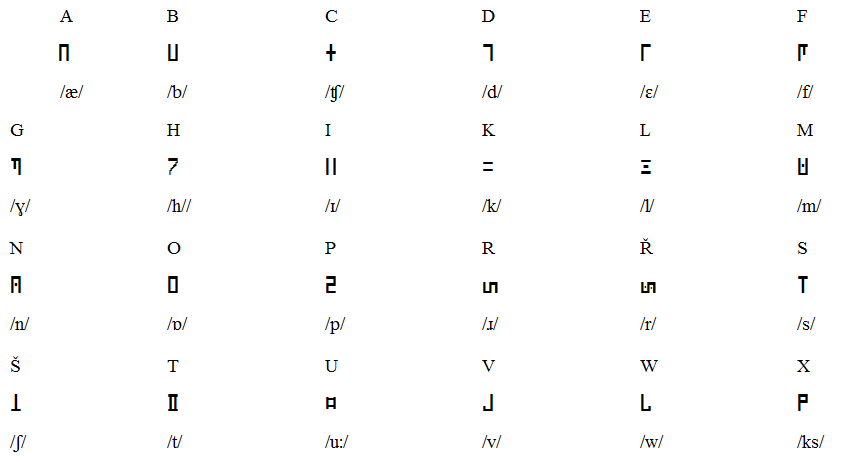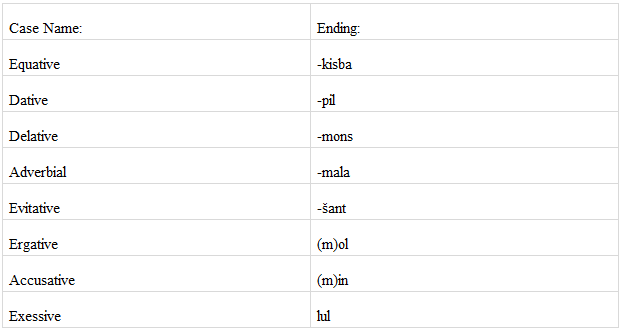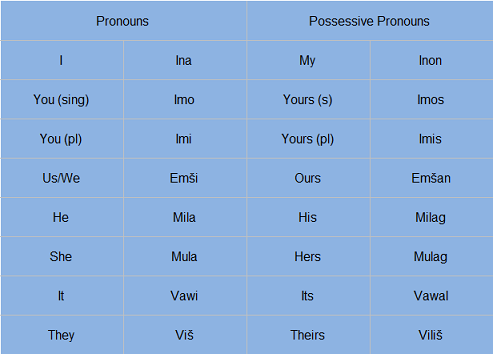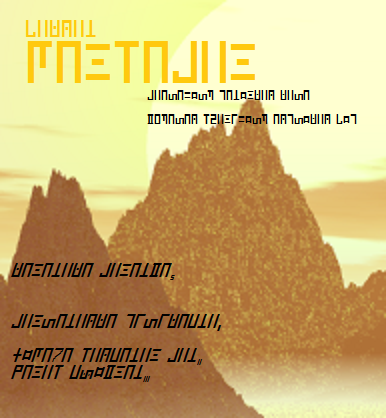Wimnish
Wimnish
National language in: Wimna
Wimnan
| |
|---|---|
| Timeline and Universe: | Irfik |
| Total speakers: | 31,300,000 |
| Genealogy: | Ceolitic
|
| Typology | |
| Morphological type: | Polysinthetic |
| Basic word order: | SVO |
| Credits | |
| Creator: | Andrew D. Wood |
| Created: | October 2012 |
Wimnish is an Irfikian language spoken in Wimna.
The language is spoken by approximately 28,000,000 people as a first language (about 15,500,000 of that as an only language), and a further 3.2 million as a second language. The language is written in the Wimnish script, a strange square-filled alphasyllabic alphabet with 24 letters; 5 vowels and 19 consonants.
The language is written in the SVO order and has 8 cases, they are: equative, dative, delative, ergative, accusative, adverbial, evitative and exessive. Below is a sample text, written and glossed, that uses all the cases so that you can see them in action.
The strange man shouted at me nastily. He was like a monster! He then changed from being monsterish, and he gave me candy!
Banlaham daxinmamol pilařakurgšant inamapil řanfamala. Nolma desantakisbašant. Milamol salsmakurg desantakisbalulminšant, milamol šuralmakurg inapil šukařamilmons!
Banlaham daxin-ma-mol řanfa-mala pilařa-kurg-šant ina-min-pil. Nolma desanta-kisba-šant strange man-def-ERG nasty-ADV shout-past-EVIT I-ACC-DAT he monster-EQU-EVIT Mila-mol salsma-kurg desanta-kisba-lul-min-šant mila-mol šuralma-kurg ina-pil šukařa-mil-mons! he-ERG change-past monster-EQU-EXE-ACC-EVIT he-ERG give-past me-DAT candy-ACC-DEL
Below is this text in the Wimnish script:
Wimnish Alphabet
The Wimnish alphabet consists of 5 vowels and 19 consonants. Below is a table of the alphabet with their transliterating equivalents and their IPA sounds.
Note: If a letter is doubled for example M in 'The Film' munhamma it is elongated. Munhamma in IPA is /mʌnhæm:æ/
Wimnish Cases
This is a quick overview of the cases, what they mean and how to use them in Wimnish.
Evitative Case
Most linguists will tell you that the evitative case is a rare one. This case is used to identify something that is to be feared or that is unpleasant. It is indicated by the particle -šant.
The evitative case always appears at the end of a word, no matter how many cases or affixes it may have.
Let's have a look at the verb 'to shout':
To Shout
- Pilařa
Now, the word on it's own just means a general shouting. If the shouting is done, however, in a frightening or unpleasant manner, then we add the evitative case.
To Shout Unpleasantly
- Pilařašant
As you see, -šant affixes to the end of the word. If we add more to the word, -šant will always be at the end.
Adding Past Simple tense -kurg:
I Shouted Unpleasantly
- Ina Pilařakurgšant
Adding Past and Continuous tense: -kurg + -iša
I was shouting unpleasantly
- Ina Pilařakurgišašant
Adverbial Case
This case acts like the English affix -ly, turning the adjective 'beautiful' into the adverb 'beautifully' and 'stupid' into 'stupidly' and so on ad infinitum ad nauseam. In Wimnish the affix for this case is -mala, and this always appears DIRECTLY after what it is adverbing. For example, let's take nasty. If you wanted to say that you where nasty, and by and by where acting nastilly for a while, your formula would be: I nasty+ADV shout+past+contin+EVIT
I was shouting nastilly
- Ina řanfamala pilařakurgišašant
- Literal translation would be: I nastilly was shouting
The adverbial case, -mala, just to reiterate, will ALWAYS come after the verb. Indeed, řanfa would just mean nasty. Also, another grammatical point, while we are on the subject, in Wimnish the adverb ALWAYS preceeds the verb.
Dative Case
The dative case is relatively simple. The idea behin the case is to indicate the noun to which something is given.
For example, let's imagine English has a dative case, and you affix -ka to the noun in question, as an example. You would say: Jon gave the pie to Liamka
The dative affix in Wimnish is -pil. Lets have a look at it in action.
Simon gave Julia a flower.
- Šimanamol šuralmakurg Gilapil patalansormin.
Šimana-mol šuralma-kurg Gila-pil patalan-sor-min. Simon-ERG give-past Julia-DAT Flower-indef-ACC.
The dative will always come last, with the exeption being if the noun was to be feared (evitative case)
Simon gave his money to the mugger
- Šimanamol šuralmakurg milag ralvaninmons šařetamapilšant
Šimana-mol šuralma-kurg milag ralvan-in-mons šařeta-ma-pil-šant Simon-ERG gave-past his money-ACC-DEL theif-def-DAT-EVIT
Let's break up šařetamapilšant. The root is šařeta which means theif/burglar we then add -ma, the definite article, then -pil, the dative, to show that whatever was given was given to the theif, then -šant to show this particular noun was unpleasant.
Breaking up ralvaninmons, we see the root form is 'ralvan' meaning money, we then add -in (the m from min is now dropped) to show the money is the subject of 'give' (in otherwords, it is what was given), and then we add -mons, the delative, to show it is moving from one place to another, in this case, from poor Simon, to the mugger.
Exessive and Equative
We have seen the Accusative, the Ergative and the Delative cases in action. I doubt I need to go into further elaboration, but we still have two cases we have nt fully explored, these are the Exessive and Equative cases.
We have all said things like 'it was monsterish' or 'it was rubbish' ect. this is the Equative case, saying that something is like something else.
Saying 'That film was rubbish' in Wimnish would be like saying 'That film was like trash' in English.
That film was rubbish
- Munhamma řagaluskisbašant
Munham-ma řagalus-kisba-šant Film-def rubbish-EQU-EVIT
The exessive case is used when a noun goes from one state of being to another, for an example, if the weather went from warm to cold, or a pizza went from raw to cooked, ect.
That film went from rubbish to good.
- Munhammamol salsmakurg řagaluskisbalulšant šahana
Munham-ma-mol salsma-kurg řagalus-kisba-lul-šant šahana Film-def-ERG change-past rubbish-EQU-EXE-EVIT good
Conclusion
Here is a simple table drawn up so you can see the case endings for all eight of the Wimnish cases.
Pronouns and Possesive Pronouns
Here is yet another handy table to show the prounouns and possessive pronouns in Wimnish:
Wimnish Supplements
One of the most popular Wimnish supplement is a monthly magazing called 'Wimniš Falsavil' or 'Wimnish Nature' Here the cover of a recent issue:
The transliteration of the magazine is:
Wimniš Falsavil
- Tiarakurg Dašulmin Mira. Togaran spilekurg Andrumin Wud
- Malašima velašta, vilrašinma deremabši cufaha sibašil viš? Xalis břutlaš!
The translation is:
Wimnish Nature
- Edited by Dašul Mira. Photography [taken] by Andrew Wood
- This week's news, The forgotten mountains, who maintains them? Page 24.




